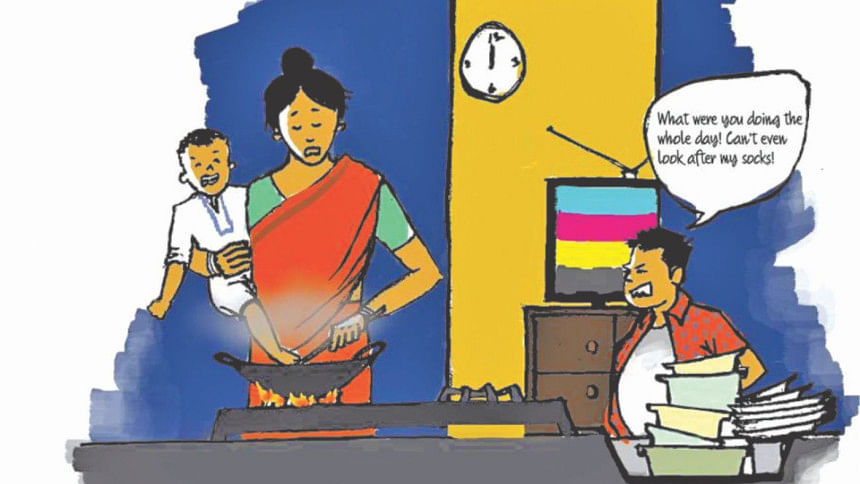How is your mother doing?

Depression can happen to anybody.
It knows no age. No social class. No sex.
And your mother, who stays at home, cooks your favourite meals and makes sure your uniform is perfectly clean and wrinkle free, is not immune to this. Yes, we are talking about your mother-- who you criticise for enjoying the absurdity of Zee Bangla serials in her free time; laugh at her for being on the phone “all day” long and often refer to her profession of homemaker as doing “nothing.”
There are far too many misconceptions and myths about depression and other mental disorders. When it comes to the mental health of homemakers, especially, people can be very critical and inconsiderate. They will say: 'But she looks fine. She never told us that she is depressed. She does not have to deal with the negativities that exist in the real world as she does not work outside-- what's the cause of her depression? She does not have an exam to fail or a deadline to meet, what would she feel anxious and stressed about?' Especially when the role flips, and we see the person who takes care of us now needs to be taken care of, we shake our head in denial and disbelief.
But how many of us have really thought about our mothers' cluttered schedules? The list of work that “needs” to be done before the rest of the family goes to sleep?
Sure, there is no direct link between being a homemaker and depression. The case might not be the same for every woman. There are some who find it very fulfilling to stay at home, take care of their family, and raise their children. On the other hand, while attempting to find the right balance between their family and work life, working mothers are also often inflicted with depression.
The problem is, as a society, we tend to put an incredible amount of pressure on women in general, and mothers in particular. However, female homemakers are perhaps more vulnerable to the sense of isolation, disconnection and worthlessness. Just like their day to day hard work, their depression often goes unrecognised and untreated, until it has taken a significant toll on the rest of the family's wellbeing.
If you take a long look at their lives, you would find one common thread in the behaviour of most Bangladeshi mothers; they put their needs last and always feel guilty about doing anything solely for their pleasure or enjoyment. Even if they do something for themselves, like shopping, reading books, or visiting a beauty salon, they often have a hard time letting go of the guilt that comes with engaging in these small pleasures.
The society, on the other hand, even now, fails to recognise household chores as real work, no matter how physically demanding and mentally stressful they are. No matter how aware we have become in terms of women empowerment, it is still a challenge to change our perspective about the status of a 'housewife' that has been embedded in our tradition for centuries.
“Think of the different pressures and expectations experienced by a homemaker,” says Sabrina Hasan, (name withheld upon request) a mother of two toddlers and a former banker. “And think of how in most cases, this contribution and hard work goes unappreciated and unrecognised. Whenever I go to my son's school to pick him up, everyone refers to me as XYZ's mother. Whenever we receive a wedding invitation, the letter says Mr and Mrs XYZ. For me, it is not about only the monotony of household chores or a lack of mental stimulation, it is also about lacking a sense of individuality, and how I am defined by only my role as a wife and mother.”
Sabrina's example of feeling disconnected and lonely- resonates in so many homemakers. Sometimes we are totally unaware of the fact that even though this person lacks motivation and energy to even perform her day to day tasks, she pushes herself to the limit to make the rest of her family happy. It's important that you talk to your mother and find out about her mental health. If you see that she is suffering from depression, even before contacting a therapist, look at the solutions that just lie around you. For many homemaking mothers, having a healthy interaction with the family and spending quality time with their children work like magic. Check in with your mother on a regular basis. Show her that you care and offer her emotional support. Have patience. Dealing with a depressed family member, especially when it's the person who takes care of everyone's wellbeing, is not that easy. Ask yourself- what are her needs and dreams? Help her reconnect with her friends (thanks to Facebook, this is not that difficult a job), and assist her in rediscovering themselves. It's important to regain her sense of individuality- so find out what her interests and hobbies are. Take her out with you for coffee or a meal. When it comes to household issues, instead of taking the backseat, help her out in her day to day work so that she has some time for herself.
Be grateful. Appreciate her work.
And most importantly, recognise her efforts and stop telling everyone that 'my mother does not work.'

 For all latest news, follow The Daily Star's Google News channel.
For all latest news, follow The Daily Star's Google News channel. 



Comments